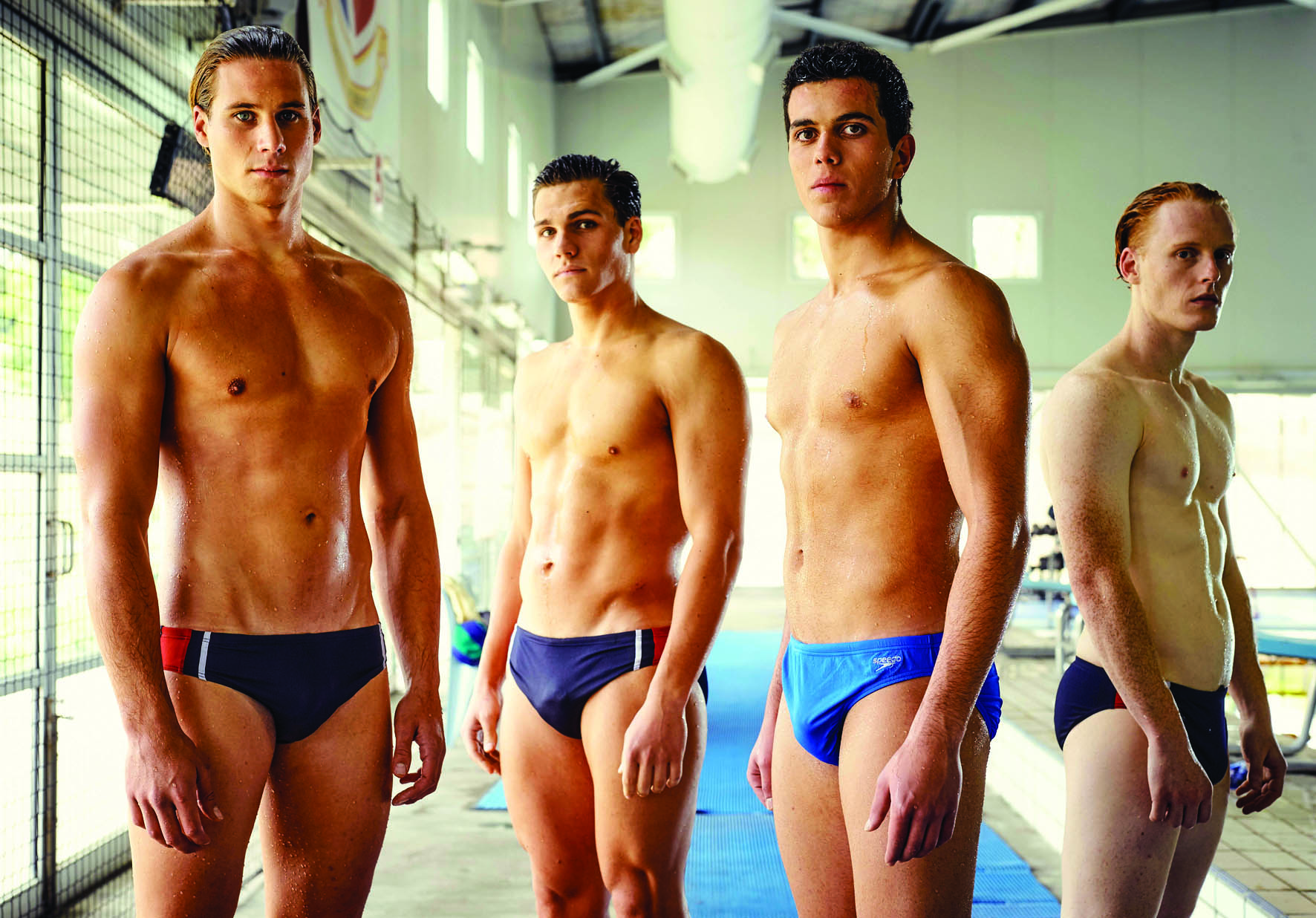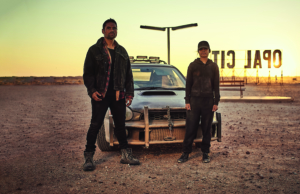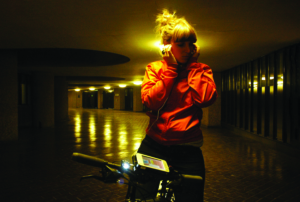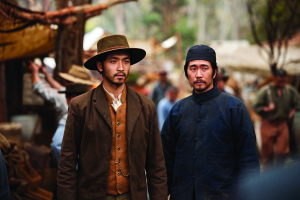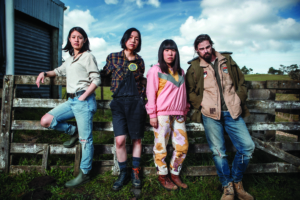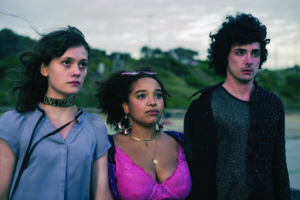At the 2016 Screen Futures Summit, Christos Tsiolkas admitted that he had never seen the 2015 TV adaptation of his 2008 bestseller The Slap. The expectation of some degree of disappointment notwithstanding, surely few writers could resist the curiosity to watch an expensively produced, widely distributed American rendition of their own, now-iconic novel? Not only that, but a second screen translation – after a highly regarded local ABC one – consumed by audiences across the globe and featuring A-list American actors including Uma Thurman and Peter Sarsgaard in the cast. In the multi-perspectival source text, an early emphasis is placed on the character of Anouk, who navigates a demanding media career, a younger boyfriend and the decision to terminate a pregnancy. For Tsiolkas, who habitually places ‘troubling ideas about the Australian mainstream within the view of a mainstream readership’,[1]Julieanne Lamond, ‘The Australian Face’, Sydney Review of Books, 29 November 2013, <http://sydneyreviewofbooks.com/the-australian-face/>, accessed 26 October 2016. it was the forfeiture of a large chunk of Anouk’s story – perhaps considered too divisive for American audiences – that put him off NBC’s adaptation.
But this anecdote was a point of departure for a different story about the adaptation of his more recent novel, 2013’s Barracuda. During a keynote panel discussing Matchbox Pictures’ 2016 rendition for the ABC, Tsiolkas was unambiguously upbeat. Not only did he cheerfully report that he’d enjoyed this newly minted, Rob Connolly–directed screen translation, but he also indicated that he felt it did justice to his novel. In spite of shifts in perspective, a more conventional linear chronology, large excisions and significant redactions to the original work, Tsiolkas agreed with a comment made by his partner as they watched the final scene of the series together: the adaptation was true to the spirit of the book. This is not to presume that Tsiolkas thinks ‘fidelity’ to source material should be the yardstick for judging adaptation to a new medium – but, in the ensuing discussion with co-panellists Elias Anton, who plays central character Danny Kelly, and Matchbox Pictures producer Tony Ayres, the famously self-effacing writer seemed utterly delighted with the work.
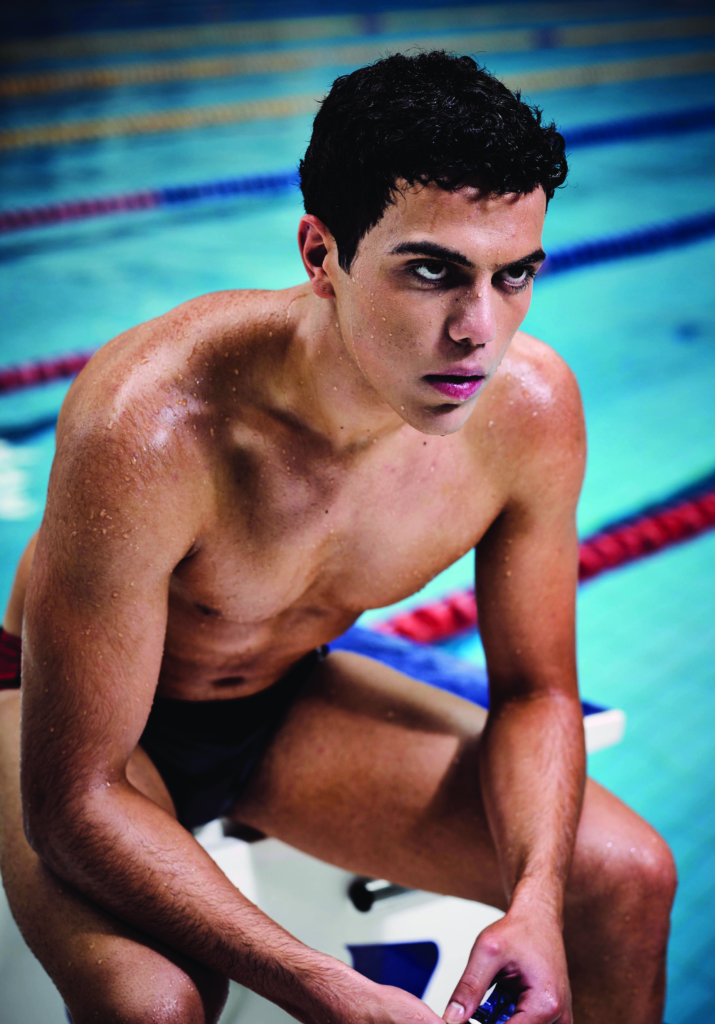
In Barracuda, a working-class boy from Melbourne’s north moves to a privileged south-side private school on a swimming scholarship to pursue his dreams of elite, perhaps Olympian, achievement. Like The Slap, Barracuda is a ‘social problem’ or ‘condition of Australia’ text, harking back to Victorian-era social-realist novels, that ‘explore[s] systemic social flaws through [its] characters’.[2]Jessica Gildersleeve, ‘Christos Tsiolkas, the “Blasphemous” Artist and Barracuda’, The Conversation, 6 July 2016, <https://theconversation.com/christos-tsiolkas-the-blasphemous-artist-and-barracuda-61434>, accessed 26 October 2016. Danny’s quest is as much a fantasy of social ascension as it is one of athletic achievement. It is this intractable inseparability of social status from the body of the individual that Tsiolkas was (again) interested in probing in Barracuda, and which makes the figure of the Australian competitive swimmer an ideal vehicle for this contemplation. This embodied experience of class and other facets of personhood like masculinity, queer sexuality and mixed ethnicity – the fusing of body and identity – makes the novel’s meditation such ideal material for a screen adaptation that is itself utterly absorbed with the movement of bodies through water and the world.
Bodies from page to screen
Beyond its concentration on the embodied character of identity, Barracuda casts a wide and ambitious net around themes that have long fascinated and preoccupied its author: multiculturalism and its discontents; the unyielding legacies of violent European and colonial histories, simmering beneath the surface of contemporary Australian life; toxic but intoxicating masculinities and the beauty of the male body; the inner lives of sexual outsiders; the dark side of urban bourgeois aspirationalism, and its relentless obfuscation of race and gender inequalities. While Tsiolkas’ novel trawls these most persistent of the author’s preoccupations, the crystalline waters of competitive swimming in elite-level pools offer a different reservoir through which to observe the underside of the Australian dream, and to thoroughly demythologise Australia’s ostensibly classless society – a ruse that, as the novel is at pains to show, spurs anxious types of competitiveness, male aggression, ethnic prejudice, liberal smugness and the unbearable shame of failure.
Barracuda’s foremost interest is in class. As it has elsewhere in Tsiolkas’ oeuvre, sexuality matters here, but class matters more. It’s less his nascent queerness that portends the most trouble for Danny, and more his blind ambition.In writing the novel, Tsiolkas has expressed that he was confronting his own ‘class treachery’,[3]Jo Lennan, ‘How Far He Had Fallen: Christos Tsiolkas’s Barracuda’, The Millions, 19 September 2014, <http://www.themillions.com/2014/09/how-far-he-had-fallen-christos-tsiolkass-barracuda.html>, accessed 26 October 2016. and both Danny and his best friend Demet ultimately come to the realisation that ‘middle class wasn’t worth it’.[4]Christos Tsiolkas, Barracuda, Allen & Unwin, Sydney, 2013, p. 408. But sexuality and class are entwined – a reality made abundantly clear in Connolly’s translation of Barracuda to the screen. Class is about the recognition of difference, and much of the dialogue and visual language of the first episode works to illustrate Danny’s fish-out-of-water status in the milieu of his new, upper-crust school. His reception there is brimming with sexual, socio-economic and racial antagonism; from the start, he’s singled out as a barely tolerated interloper.
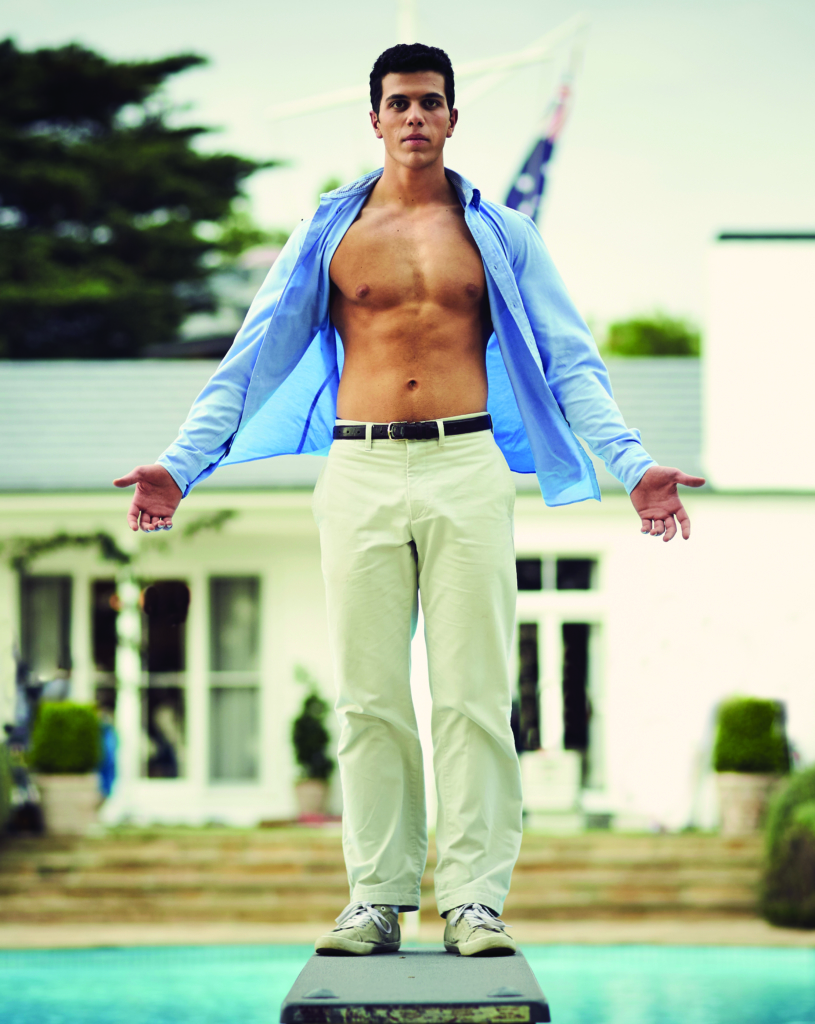
The swimming pool is the school’s sparkling epicentre, an expensive facility and the repository for Danny’s expansive dreams. But it is flanked by the darker, cramped spaces of the locker room, a hotbed of homosocial bonding, naked bodies, ritualised racism and effeminophobia. Danny’s new teammates ask him whether he likes the pool, and he’s taunted by the smart-mouthed Tsitsas (Joe Klocek), the team’s weakest swimmer: ‘It must be nice for someone like you not to have to dodge all the bandaids and condoms and shit.’ The insult’s subtext is as sexual as it is class-based.
Dirtiness and cleanliness suffuse the aesthetics of class-based prejudice and the embodied experience of class identification. The novel’s Danny reflects, with both pride and ambivalence, on the shaping of the working-class body through labour:
He saw himself slicing open boxes and stacking supermarket shelves, smelled how sour and tart his sweat was at the end of an all-night shift; saw his father driving back and forth across the sea of the Nullarbor; saw his mother cutting hair […] his granddad Bill’s skill as a bricklayer and his nan being a typist: all that labour and exertion and sweat, how the body was moulded and transformed by that work.[5]ibid., p. 409.
Rich people, on the other hand, are smooth, spotless and sweet-smelling. Danny’s classmates have ‘the clearest skin he had ever seen and the best cut hair and the whitest and most perfect teeth’.[6]ibid., p. 16. His teammates Wilco (Andrew Creer) and Martin Taylor (Benjamin Kindon), the golden-boy antagonist that Danny soon befriends, are strapping young Anglo men with light hair and blue eyes – Australian boys who look as comfortable in a pair of Country Road chinos as they do in their speedos. Episode 1 makes this evident by turning out the character of Martin immaculately in every shot. Fresh from the shower, his golden skin positively gleams. Only just emerged from the pool, his hair is styled as though for a fashion shoot. Kindon’s performance is languid and self-assured. ‘Taylor never ponged,’ reflects the novel’s Danny, ‘how was it that other boys always seemed to smell so sweet?’[7]ibid., p. 215. The camera’s lingering gaze indicates that, for him, these affluent, entitled young men are complex objects of lust, identification and aspiration, but also of danger and competition. ‘These boys here are not your mates,’ Coach Torma (Matt Nable), a Hungarian migrant and a persistent stirrer of Danny’s antagonism, warns him after their first training session.
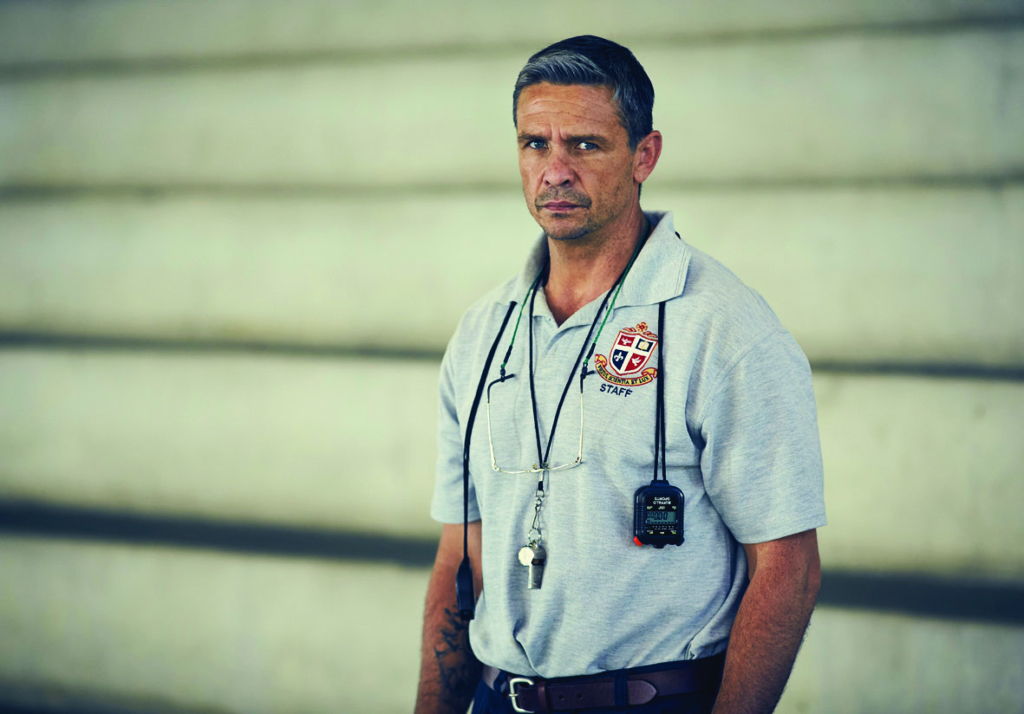
Danny is a classic angry, desiring young male Tsiolkas protagonist. He recalls the restless, closeted cravings and unprocessed rage of Ari from the author’s debut novel, 1995’s Loaded, and revives the confusing imbrication of (homo)sexual desire with class aspiration embodied by another Daniel, whose angry monologue opens ‘Suit’, Tsiolkas’ contribution to the 1999 four-work theatre collaboration Who’s Afraid of the Working Class? In ‘Suit’, the unemployed Daniel, hailing from the working-class Melbourne suburb of Dandenong, begrudgingly attends a rally against the Victorian Liberal government. Instead of siding with the protestors, Daniel confesses his sexual fantasies about Liberal Party leader Jeff Kennett, whose state policies continue to impoverish Daniel’s family and thousands of other working-class Victorians. The description of the play’s characters in the program notes for Who’s Afraid of the Working Class? applies to Barracuda’s Danny: he’s a similarly beleaguered working-class character who doesn’t ‘struggle politically, heroically, or resistively, but badly, personally and in anguish’,[8]Cited in Kaye Tucker, ‘Who’s Afraid of the Working Class? – the Melbourne Workers Theatre’, World Socialist Web Site, 1 October 1999, <http://www.wsws.org/en/articles/1999/10/mwt-o01.html>, accessed 26 October 2016. and who has a left-leaning, Workers’ Union card–carrying truck-driver dad (played in the ABC series by Jeremy Lindsay Taylor).
Danny’s sexual and class aspirations quickly settle on Martin, that beautiful white young man who is as troubled by familial expectation as he is spoiled by dynastic power and privilege.
Like the earlier Daniel’s lust for the potent embodiment of conservative masculinity who would, politically speaking, seem to be his natural nemesis, Danny’s sexual and class aspirations quickly settle on Martin, that beautiful white young man who is as troubled by familial expectation as he is spoiled by dynastic power and privilege. Part of the excellence of the Connolly–Ayres adaptation is that it’s not unsympathetic towards Martin. In Episode 2, Danny is taken to the Taylors’ Portsea beach house to partake in birthday celebrations for Martin’s grandmother (Helen Morse). It’s a lavish society sequence that evokes some of the best of British costumed drama and its dry scrutiny of upper-class customs. Here, we witness something more of the pressures put upon Martin by his haughty mother, Samantha (Rachel Griffiths, in a pitch-perfect and equally sympathetic performance of the controlling, pearl-clutching ‘Malvern Matron’), who wants him to win so much she won’t even let him enjoy a piece of birthday cake. For Martin, failing in the pool may ultimately liberate him from her stifling scrutiny.

That the Portsea sequence recalls a comedy-of-manners-and-class like that of British heritage cinema and TV suggests that the pretensions and proprieties of class distinction are alive and well in contemporary Australia. Birthday lunch is a wry set piece in which the dangerous, smug carelessness of the very rich is always matched by the radiance and brilliance of their veneers – the whitest of teeth; the sparkliest of pools; real estate with sweeping beach vistas; a sea of crisp, pale shirts tucked into cream chinos. In this way, both iterations of Barracuda recall Alan Hollinghurst’s novel The Line of Beauty and its glossy, realist BBC adaptation, in which a semi-closeted queer middle-class interloper slips into the homes of the rich and powerful landed white aristocracy of 1980s Thatcherite London. Just like The Line of Beauty’s Nick Guest befriends and becomes infatuated with handsome Tory offspring Toby Fedden, Danny develops an intense crush on upper-crust Martin. Danny may be less motivated by an elegiac, aesthetic investment in the property and proprieties of the aristocratic class, but, like Nick, he is baldly ambitious and neoliberal in his individualistic ascension goals. He wants to be as good as Martin; he wants to be better. ‘You are authentic,’ Martin’s grandmother tells him from her regal perch; he replies, ‘I’m gonna be the best.’ ‘They’ll hate you for it,’ she warns.
Danny’s entree into this milieu makes him both an outsider and someone frequently exposed to the privileged inside; this does little to temper his hot-headedness, but affords viewers a nuanced look into and across class experiences of Melbourne. Danny walks between worlds, and the camera follows him on his meanderings through the porticoes and arches of the sandstone school, to the skate park where he meets Demet (Nicole Gulasekharam) and friends from his old high school, and back to his suburban home. Danny seems to swell in size when he achieves something in the pool: we trail him exiting the locker room, where he has adamantly and arrogantly declared Torma to be wrong – no, he will not sacrifice the 100-metre freestyle to focus on butterfly, the stroke in which he more clearly excels. Here, the camera is right behind Anton’s large head and broad shoulders, the tall, young actor striding powerfully through the low-ceilinged corridors out of the locker room to appear heroic, like a sporting colossus. Later, when he arrives at the Taylors’ Toorak mansion, a long shot indicates that he is literally dwarfed by the house. Tracking the restless movement of Danny’s body through these spaces, the camera offers insights into class difference as it manifests in the shifting dynamics of embodied power and privilege in different social spaces.
The pool encapsulates the fantasy of mobility. It’s a transparent space in which bodies seem able to transcend their designations of identity and success through sheer force of muscle … The material conditions of life and history evaporate in Australian cultural narratives of the pool.
The crisp, clear water of the pool is another ambivalent space, and a complex metaphor for the uniquely sunny darkness of contemporary Australia and its ideological mirage of egalitarianism. The pool encapsulates the fantasy of mobility. It’s a transparent space in which bodies seem able to transcend their designations of identity and success through sheer force of muscle. It is a place whose undercurrents of conflict and hatred are easily masked by soft-focus images of athletic bodies poised like Greek sculptures on starting blocks, or gracefully and powerfully hurtling down lanes. The material conditions of life and history evaporate in Australian cultural narratives of the pool. The notion that the fastest competitor overcomes adversity and achieves success through independent performance is central to our national mythology, and Barracuda provides a bounty of accompanying images. But, while the more popular films of the sports genre frequently work overtime to displace or overcome social conflict in order to sustain the utopian vision that athletic success can offer, Barracuda undermines this mythology.
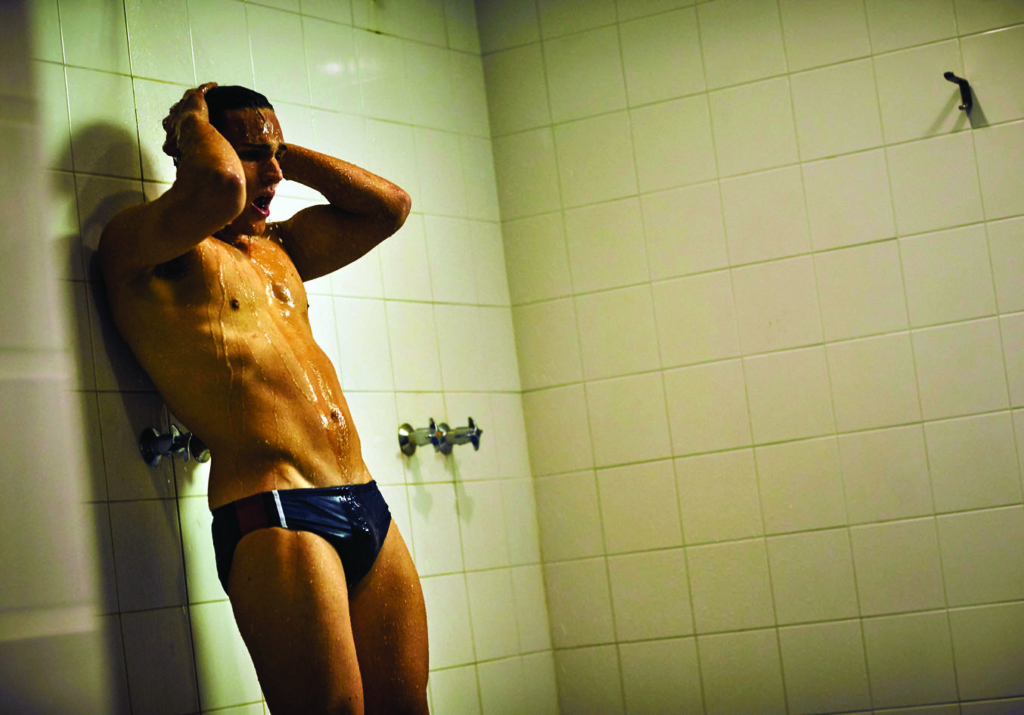
The sports movie on TV
Significant excisions have occurred in the process of adapting Tsiolkas’ angry-young-man bildungsroman to the screen, including a lot of anal sex – explicit sex scenes that, in the novel, are Jean Genet–style acts of abject self-abnegation[9]Jennifer Mills describes Barracuda as ‘the Querelle de Brest of Australian suburbia’; see Mills, ‘Barracuda and Middle-class Self-hatred’, Overland, 21 November 2013, <https://overland.org.au/2013/11/barracuda-and-middle-class-self hatred/>, accessed 26 October 2016. and become rites of redemption for the fallen Danny. Rather than ‘de-gayed’, queer sex is moved largely into subtext, or projected into Danny’s potential future – it hasn’t happened yet. Whereas the novel’s chronology is jumbled, the ABC’s Barracuda has a newly innovated linearity, offering a more constrained approach to the story by concentrating on the most dramatic moments of competitive swimming. With Connolly as sole director across the four episodes, the series has a consistent style and focuses mostly on the world of sport to unpack a particularly Australian type of ambition and its perils.
Sport is an ideal vehicle for championing the pursuit of individual achievement, ascension and success because these values are so unapologetically celebrated in the athletic arena. The media relentlessly envelops sporting figures in rags-to-riches stories that make them appear heroic but align with everyday aspirations – mundane desires to transcend the individual’s material conditions, their body, gender or class. These stories are part of the national consciousness. As Steve Georgakis writes:
For most Australians, sport is a privileged social institution which is supposed to inspire and unite. Success at international level, especially at the time of the Olympics, is a particular high point in this cycle. In periods of sporting success, nationalism and Australia’s self-esteem is raised to levels which no other institution can achieve.[10]Steve Georgakis, ‘How Barracuda Has Hit a Nerve’, Arts Review, 18 July 2016, <http://artsreview.com.au/how-barracuda-has-hit-a-nerve/>, accessed 26 October 2016.
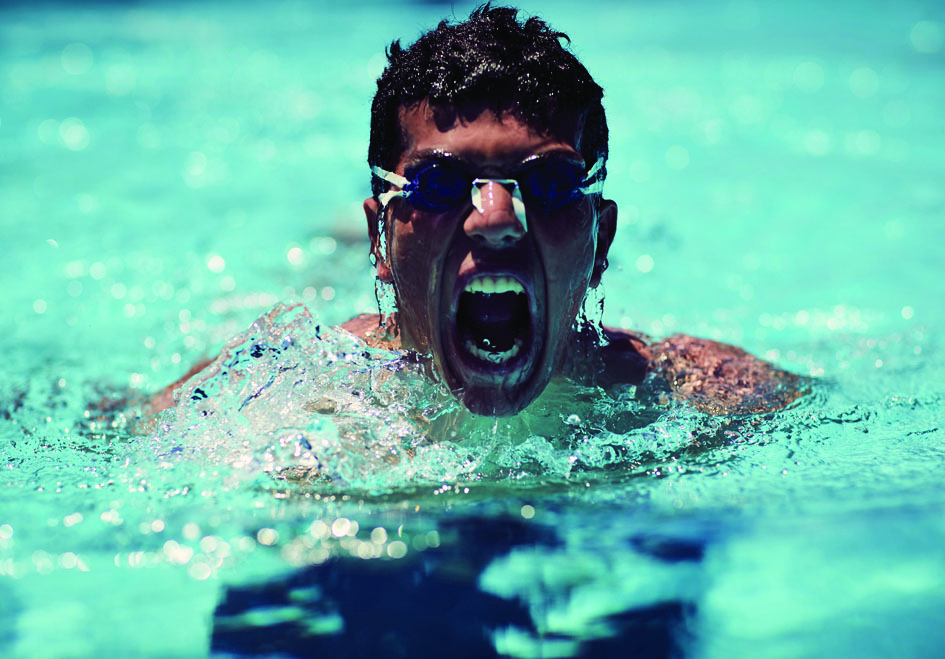
In cinematic accounts, sport is ‘the factory which manufactures heroic winners’.[11]ibid. And, while Barracuda is technically a television miniseries, at Screen Futures, Ayres said that the team ‘were writing a sports movie […] It feels like you’re watching a four-hour movie.’ The sports film is traditionally a celebration of muscular nationhood and, in Australia, it has operated as a conduit for myths about egalitarianism, upward mobility and unlikely forms of accessible heroism. Most sports films are based on the attempts of individual protagonists to achieve a single but elaborate goal: a win in the finals, the smashing of a fierce and feared opponent, Olympic victory. In the classic masculinist version of the genre, an opponent, antagonist or some kind of societal inhibition creates an obstacle to this outcome, which the protagonist must surmount in order to achieve their goal, thereby producing narrative desire, tension, expectation and progress. Sport provides ready-made material for a narrative desire that strains towards success. Part of the potency of fictional sports narratives lies in the way they chime with the everyday cultural narrative of sport, and with the media’s representation of sport as a form of local or national heroism. The romantic impulses of the heroic quest structure of the sports genre set out some of our most fundamental expectations about sport, and vice versa.
Typically, in sports films, editing and camera framing conspire to heighten the realism in scenes of competition, validating the ideology of agency that assumes that individual performance counts the most in making athletes who they are and in bringing about sporting success. Contra this convention, Barracuda’s underwater swimming scenes have a hyperreal, slowed-down, meditative, otherworldly quality that emphasises the fantasy and interiority of competitive athleticism. According to Connolly, Barracuda offered him an opportunity to consider the national fixation with swimming from a fresh perspective: ‘The biggest challenge for me was how to depict swimming in a way that hasn’t been seen before.’[12]Robert Connolly, quoted in Karl Quinn, ‘Sport, Sex, Race and Class: TV Series Barracuda Explores the Cost of Our National Obsession’, The Sydney Morning Herald, 4 July 2016, <http://www.smh.com.au/entertainment/tv-and-radio/sport-sex-race-and-class-tv-series-barracuda-explores-the-cost-of-our-national-obsession-20160629-gpv412.html>, accessed 26 October 2016. The water may be glistening, but, as Luke Buckmaster writes, ‘the serendipitous pool imagery is a chimera’.[13]Luke Buckmaster, ‘Barracuda Review – a Valuable Australian Story, with a One-for-the-ages Finale’, The Guardian, 11 July 2016, <https://www.theguardian.com/tv-and-radio/2016/jul/11/barracuda-review-a-valuableaustralian-story-with-a-one-for-the-ages-finale>, accessed 26 October 2016. ‘This is a sports story,’ clarifies co-screenwriter Blake Ayshford, ‘but it has Christos’ […] particular views on ethnicity and class.’[14]Blake Ayshford, quoted in Quinn, op. cit.
Australia’s relationship to the bodies of its male sporting heroes is a complex one, with erotic subtexts that are barely submerged. We exploit and spectacularise the ideal male body (and where better to source examples than the sporting world?), a physical aspiration that populates the landscape of advertising and its unabashed ‘sporno’ aesthetics. Yet the mediation of sport also continually disavows the sexuality of the sporting body, allowing us to carry on watching and playing without the spectre of homoeroticism. Our culture wants to have it both ways, and the sports film has long been a guise for exploiting homoerotic gazes in homosocial contexts. Barracuda joins a lineage of other film and TV productions with watery or beach settings, like Tan Lines (Ed Aldridge, 2005) and Downriver (Grant Scicluna, 2015). Surfing film Newcastle (Dan Castle, 2008), described as ‘a pilot for Boy Baywatch’,[15]Daniel Villarreal, ‘Hey Dudes, Here’s the 3 Gayest Surfing Movies Ever’, Queerty, 30 April 2010, <https://www.queerty.com/hey-dudes-heres-the-3-gayest-surfing-movies-ever-20100430/2>, accessed 26 October 2016. is peopled with ‘lean, often naked teenage boys […] as longingly photographed as the 10-foot waves’.[16]Mathieu Ravier, ‘Film – Newcastle’, Same Same, 3 November 2008, <http://www.samesame.com.au/reviews/3179/Film–Newcastle>, accessed 26 October 2016. Dean Francis’ Drown (2015) looks at similar dynamics in the world of Bondi surf lifesavers, extending the themes of the director’s short film Boys Grammar (2005), in which the anguish experienced by a victim of homophobic bullying is mixed up with a lust for the body and the hierarchical privilege of the top-dog prefect bully himself. Drown throws open the ideological closet of Australian sporting culture, contributing to a growing awareness of the sex scandals, unbearable pressures, institutionalised bullying and brutality that bedevil competitive Australian sport at all levels. In Barracuda, the sports genre has been mobilised to foreground these subcultures and the limits to which they will tolerate the presence of ethnic, sexual or class outsiders.
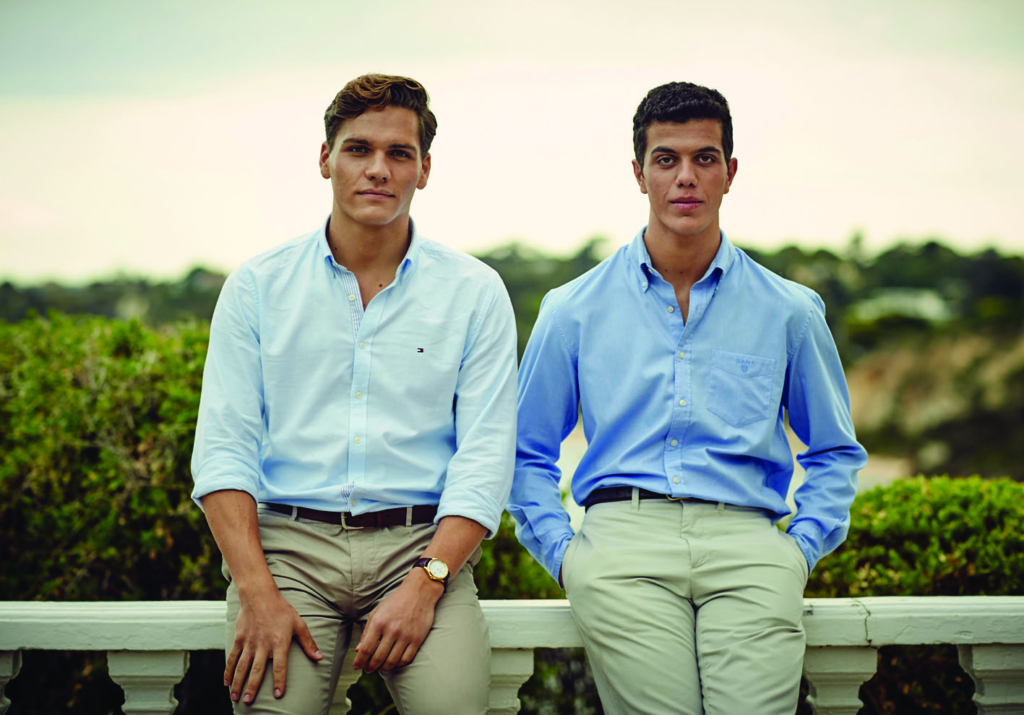
Conclusion
As Julieanne Lamond writes:
Sport is an ideal subject for Tsiolkas because it is the point of intersection between body and nation. In sport, the body represents the nation and a fixation on the workings of specific bodies is sanctioned by the language of belonging.[17]Lamond, op. cit.
The pressure on young sportspeople to carry the weight of scrutiny and national iconicity is immense, and losing in that arena is unbearable. In Barracuda, the trajectory of the sports films is overturned. Danny’s destiny is failure, and ambition turns him into a monster.
By capturing what Jennifer Mills has described as a ‘Dostoyevskian process’[18]Mills, op. cit. centring on ambition, rage and the legacies of spectacular failure in a tightly concentrated sports narrative, the Barracuda adaptation offers a much-needed corrective to Australian myths about egalitarianism and athletic achievement. It’s a tragedy of class in which sport is deeply implicated in both the fantasies and unrealities of social mobility – as Buckmaster puts it, a ‘valuable addition to the generally conventionally minded canon of Australian film and TV sports stories’[19]Buckmaster, op. cit. because of its capacity to expose the darker side of sporting heroism. As Ayres explained at Screen Futures, Barracuda has the markings of the sports genre, but with the trademark ‘fucked-up-ness’ to be reliably found in Tsiolkas’ work.
http://www.abc.net.au/tv/programs/barracuda/
Endnotes
| 1 | Julieanne Lamond, ‘The Australian Face’, Sydney Review of Books, 29 November 2013, <http://sydneyreviewofbooks.com/the-australian-face/>, accessed 26 October 2016. |
|---|---|
| 2 | Jessica Gildersleeve, ‘Christos Tsiolkas, the “Blasphemous” Artist and Barracuda’, The Conversation, 6 July 2016, <https://theconversation.com/christos-tsiolkas-the-blasphemous-artist-and-barracuda-61434>, accessed 26 October 2016. |
| 3 | Jo Lennan, ‘How Far He Had Fallen: Christos Tsiolkas’s Barracuda’, The Millions, 19 September 2014, <http://www.themillions.com/2014/09/how-far-he-had-fallen-christos-tsiolkass-barracuda.html>, accessed 26 October 2016. |
| 4 | Christos Tsiolkas, Barracuda, Allen & Unwin, Sydney, 2013, p. 408. |
| 5 | ibid., p. 409. |
| 6 | ibid., p. 16. |
| 7 | ibid., p. 215. |
| 8 | Cited in Kaye Tucker, ‘Who’s Afraid of the Working Class? – the Melbourne Workers Theatre’, World Socialist Web Site, 1 October 1999, <http://www.wsws.org/en/articles/1999/10/mwt-o01.html>, accessed 26 October 2016. |
| 9 | Jennifer Mills describes Barracuda as ‘the Querelle de Brest of Australian suburbia’; see Mills, ‘Barracuda and Middle-class Self-hatred’, Overland, 21 November 2013, <https://overland.org.au/2013/11/barracuda-and-middle-class-self hatred/>, accessed 26 October 2016. |
| 10 | Steve Georgakis, ‘How Barracuda Has Hit a Nerve’, Arts Review, 18 July 2016, <http://artsreview.com.au/how-barracuda-has-hit-a-nerve/>, accessed 26 October 2016. |
| 11 | ibid. |
| 12 | Robert Connolly, quoted in Karl Quinn, ‘Sport, Sex, Race and Class: TV Series Barracuda Explores the Cost of Our National Obsession’, The Sydney Morning Herald, 4 July 2016, <http://www.smh.com.au/entertainment/tv-and-radio/sport-sex-race-and-class-tv-series-barracuda-explores-the-cost-of-our-national-obsession-20160629-gpv412.html>, accessed 26 October 2016. |
| 13 | Luke Buckmaster, ‘Barracuda Review – a Valuable Australian Story, with a One-for-the-ages Finale’, The Guardian, 11 July 2016, <https://www.theguardian.com/tv-and-radio/2016/jul/11/barracuda-review-a-valuableaustralian-story-with-a-one-for-the-ages-finale>, accessed 26 October 2016. |
| 14 | Blake Ayshford, quoted in Quinn, op. cit. |
| 15 | Daniel Villarreal, ‘Hey Dudes, Here’s the 3 Gayest Surfing Movies Ever’, Queerty, 30 April 2010, <https://www.queerty.com/hey-dudes-heres-the-3-gayest-surfing-movies-ever-20100430/2>, accessed 26 October 2016. |
| 16 | Mathieu Ravier, ‘Film – Newcastle’, Same Same, 3 November 2008, <http://www.samesame.com.au/reviews/3179/Film–Newcastle>, accessed 26 October 2016. |
| 17 | Lamond, op. cit. |
| 18 | Mills, op. cit. |
| 19 | Buckmaster, op. cit. |
